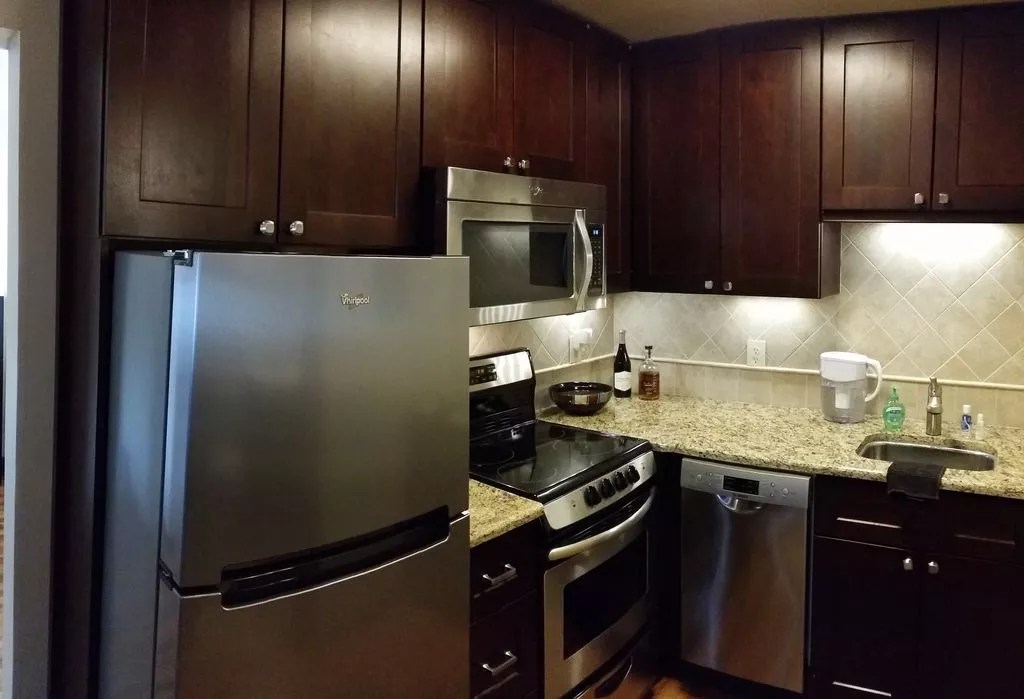

Audio By Carbonatix
After moving from Florida to Alamosa, Michelle and her sixteen-year-old daughter realized that they had to get away from Michelle’s husband. “He just got totally super violent. He just wanted to kill us. I guess he flipped. But he was doing a lot of alcohol and drugs, so I had to escape from that,” says Michelle, who asked that her full name not be used.
She and her daughter quickly left for Denver, where they linked up with SafeHouse Denver, which provides emergency shelter for domestic-violence victims and their children.
“They let me stay there for a while. They put me on a housing list, and I was like first on the list to get into the place,” says Michelle, who spent two weeks in the emergency shelter before she and her daughter moved into a two-bedroom apartment in the Globeville area. “It’s really nice…I don’t know how I got a place in this building. I guess God is guiding us.”
Actually, the guide was Housing Connector, a Seattle-based nonprofit that launched in late 2019 and, after helping house 2,500 people in that city, recently expanded into Denver.
“Our vision is that there shouldn’t be any units in our community open if we have people in need of housing,” says ShkÁ«lqim Kelmendi, executive director of Housing Connector, which works with landlords, potential renters and service providers to ensure that issues like credit scores and criminal history don’t prevent someone from securing housing.
The Metro Denver Homeless Initiative had identified Housing Connector’s services as a real need in this city, Kelmendi adds: “My sense is that this type of service was attempted at individual agencies, but a community-wide effort had not been pursued. A critical piece of this solution is the back-end technology and customer-facing platform to manage inventory in real time and make these units accessible. That’s one reason we have had success.”
The company says that it operates at about a 96.5 percent success and retention rate, partly because of its commitment to clients. “Once somebody moves in, we actually stick around with them for two years,” says Kelmendi, noting that the nonprofit will even jump in and pay rent if there’s an emergency.
For Michelle, that means she’ll have housing stability support for the next two years, according to Ramsey Ferguson, one of Housing Connector’s two Denver-based employees. “Should she have any issues with rent, we’ll be able to step in and help with that up to three times,” Ferguson says.
That support helps Housing Connector with its goal, to “start changing the conversation and the perception around how landlords and service providers work together,” says Kelmendi.
“That makes such a big difference with us because it does lower the liability from the owner’s standpoint as well. We’re not left holding a huge loss in money,” notes Brooke Parra, executive vice president for Ross, which manages affordable-housing complexes in metro Denver and has been working with the nonprofit.
Housing Connector receives funding from Zillow and uses its platform. Through Zillow, service providers are able to see specific housing options with less stringent requirements already negotiated with Housing Connector, including accepting vouchers. “It’s about 40 percent right now who are using vouchers. Some people have other ways to pay for units. Some have traditional jobs,” says Terra Miezwa, the other Denver-based Housing Connector employee.
Since it moved into Denver in late November, the nonprofit has formed ties with organizations like the Denver Rescue Mission and the Jewish Family Service. The majority of the people Housing Connector has helped link to housing have been people of color. “The systemic racism bleeds into the housing search,” notes Kelmendi. “A positive externality has been, we are making some of these levels of discrimination, like credit scores and criminal history, obsolete because we pre-negotiate them.”
The goal is to make arrangements for about 200 households in the first year of operations in Denver; after that, Housing Connector wants to accommodate 400 households annually, at a total cost of about $550,000 per year.
“This is totally new for me and my daughter – a new life,” says Michelle, who notes that her daughter is making progress in Denver’s schools. “She’s doing really good. She’s an A student so far.”